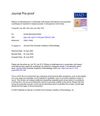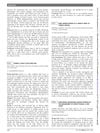 5 citations,
July 2020 in “Journal of the American Academy of Dermatology”
5 citations,
July 2020 in “Journal of the American Academy of Dermatology” Adding antihistamines to topical corticosteroid and cryotherapy may improve hair regrowth in alopecia areata patients.
65 citations,
November 2008 in “Pediatric Dermatology” Phototherapy is effective and well-tolerated for treating childhood psoriasis and pityriasis lichenoides chronica.
 9 citations,
January 2022 in “Reproductive Biology and Endocrinology”
9 citations,
January 2022 in “Reproductive Biology and Endocrinology” High levels of male hormones and irregular periods best predict how well PCOS patients will respond to metformin treatment.
 December 2022 in “Small methods”
December 2022 in “Small methods” A new hair loss treatment using dissolving microneedles was found to speed up hair growth and was more effective than daily use of common hair growth drugs.
 1 citations,
January 2000 in “Springer eBooks”
1 citations,
January 2000 in “Springer eBooks” Pregnancy can cause various skin changes and diseases, requiring careful treatment to protect the baby.
 April 2024 in “Indian journal of ophthalmology. Case reports”
April 2024 in “Indian journal of ophthalmology. Case reports” Using minoxidil for hair loss might rarely cause a vision problem where fluid builds up under the retina.
69 citations,
July 2002 in “Clinical and Experimental Dermatology” Alopecia areata is influenced by genetics and immune system factors, and better understanding could improve treatments.
 43 citations,
August 2010 in “Expert Opinion on Investigational Drugs”
43 citations,
August 2010 in “Expert Opinion on Investigational Drugs” Inhibitors of 11β-HSD1 show potential for treating type 2 diabetes but require more testing for safety and effectiveness.
 1 citations,
April 2023 in “Frontiers in Genetics”
1 citations,
April 2023 in “Frontiers in Genetics” The document concludes that individuals with a rare genetic disorder linked to the AEBP1 gene may experience a unique type of hair loss and should be monitored for heart issues.

Kerion is a rare but serious scalp infection that needs proper treatment.
 7 citations,
December 2019 in “Pharmaceutics”
7 citations,
December 2019 in “Pharmaceutics” Taking Dutasteride with Ketoconazole can increase Dutasteride's effects and side effects.
 24 citations,
July 2017 in “Structure”
24 citations,
July 2017 in “Structure” FGF9 controls which receptors it binds to through a process where two FGF9 molecules join, and changes in FGF9 can lead to incorrect receptor activation.
 10 citations,
February 2013 in “British Journal of Dermatology”
10 citations,
February 2013 in “British Journal of Dermatology” Thyrotropin-releasing hormone may help control skin and hair growth and could aid in treating related disorders.
 10 citations,
February 2009 in “European urology. Supplement”
10 citations,
February 2009 in “European urology. Supplement” Treatment for benign prostatic hyperplasia involves drugs that either quickly relieve symptoms or reduce prostate size, with a combination offering more benefits but more side effects.
 December 2018 in “IntechOpen eBooks”
December 2018 in “IntechOpen eBooks” Neurohormones help control skin health and could treat skin disorders.
86 citations,
June 2018 in “Cochrane library” Mycophenolate mofetil may improve lupus nephritis remission more than cyclophosphamide but with uncertain safety.
 27 citations,
February 2014 in “Planta Medica”
27 citations,
February 2014 in “Planta Medica” Scutellaria baicalensis extract and baicalin may help prevent hair loss.
 May 2019 in “Australasian Journal of Dermatology”
May 2019 in “Australasian Journal of Dermatology” The conclusion is that managing hair loss conditions like FFA and melanoma requires individualized approaches, considering new findings and balancing treatment benefits with potential risks.
 28 citations,
May 2018 in “Scientific reports”
28 citations,
May 2018 in “Scientific reports” Exercise improves insulin sensitivity and hormone regulation in PCOS rats.
 19 citations,
January 2014 in “Facial plastic surgery”
19 citations,
January 2014 in “Facial plastic surgery” Dermabrasion improves skin appearance by removing the top layer to promote healing.
 June 2017 in “Journal of The European Academy of Dermatology and Venereology”
June 2017 in “Journal of The European Academy of Dermatology and Venereology” Alopecia patients have higher heart disease risk; statins and finasteride may help.
 January 2011 in “International Journal of Trichology”
January 2011 in “International Journal of Trichology” The conference highlighted new diagnostic tools, the role of genetics in hair loss, and emerging treatments.
 26 citations,
December 2016 in “Pharmacology & Therapeutics”
26 citations,
December 2016 in “Pharmacology & Therapeutics” New drugs for heart disease may be developed from molecules secreted by stem cells.
 27 citations,
June 2015 in “Journal of photochemistry and photobiology. B, Biology”
27 citations,
June 2015 in “Journal of photochemistry and photobiology. B, Biology” The new lab-grown skin model is good for testing sunscreen's protection against DNA damage from UV light.
 11 citations,
December 2011 in “Revista Brasileira de Farmacognosia”
11 citations,
December 2011 in “Revista Brasileira de Farmacognosia” The seeds of Abrus precatorius, when processed, can prevent hair loss more effectively than common treatments.
 1 citations,
January 2011 in “International Journal of Trichology”
1 citations,
January 2011 in “International Journal of Trichology” Hair follicle stem cells have significant potential for treating various disorders.
 19 citations,
December 2013 in “European journal of pharmaceutics and biopharmaceutics”
19 citations,
December 2013 in “European journal of pharmaceutics and biopharmaceutics” Encapsulated Garcinia mangostana extract in cream penetrates skin better than other forms.
 8 citations,
October 2021 in “Indian Journal of Plastic Surgery/Indian journal of plastic surgery”
8 citations,
October 2021 in “Indian Journal of Plastic Surgery/Indian journal of plastic surgery” Hair transplants are mostly safe but can have minor complications.
 94 citations,
May 2011 in “BJCP. British journal of clinical pharmacology/British journal of clinical pharmacology”
94 citations,
May 2011 in “BJCP. British journal of clinical pharmacology/British journal of clinical pharmacology” Hair follicles greatly increase caffeine absorption through the skin shortly after it's applied.
70 citations,
January 2014 in “International review of cell and molecular biology” Keratin proteins are crucial for healthy skin, but mutations can cause skin disorders with no effective treatments yet.

























